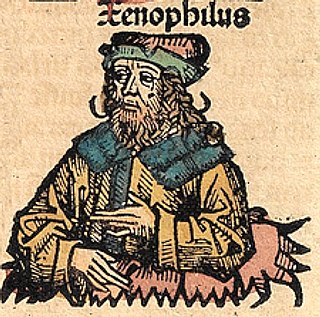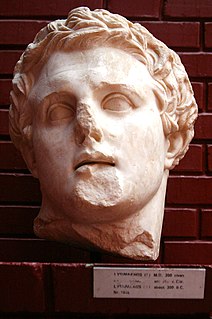Alexis was a Greek comic poet of the Middle Comedy period. He was born at Thurii in Magna Graecia and taken early to Athens, where he became a citizen, being enrolled in the deme Oion (Οἶον) and the tribe Leontides. It is thought he lived to the age of 106 and died on the stage while being crowned. According to the Suda, a 10th-century encyclopedia, Alexis was the paternal uncle of the dramatist Menander and wrote 245 comedies, of which only fragments now survive, including some 130 preserved titles.

Aulus Gellius was a Latin author and grammarian, who was probably born and certainly brought up in Rome. He was educated in Athens, after which he returned to Rome. He is famous for his Attic Nights, a commonplace book, or compilation of notes on grammar, philosophy, history, antiquarianism, and other subjects, preserving fragments of the works of many authors who might otherwise be unknown today.
Apion was a Hellenized Egyptian grammarian, sophist, and commentator on Homer. He was born at the Siwa Oasis and flourished in the first half of the 1st century AD. His name is sometimes incorrectly spelt Appion, and some sources, as in the Suda, call him a son of Pleistoneices, while others more correctly state that Pleistoneices was only a surname, and that he was the son of Poseidonius.

Panaetius of Rhodes was a Stoic philosopher. He was a pupil of Diogenes of Babylon and Antipater of Tarsus in Athens, before moving to Rome where he did much to introduce Stoic doctrines to the city. After the death of Scipio in 129 BC, he returned to the Stoic school in Athens, and was its last undisputed scholarch. With Panaetius, Stoicism became much more eclectic. His most famous work was his On Duties, the principal source used by Cicero in his own work of the same name.

Onesicritus, a Greek historical writer, who accompanied Alexander the Great on his campaigns in Asia. He claimed to have been the commander of Alexander's fleet but was actually only a helmsman; Arrian and Nearchus often criticize him for this. When he returned home, he wrote a history of Alexander's campaigns. He is frequently cited by later authors, who also criticize him for his inaccuracies.
Critolaus of Phaselis was a Greek philosopher of the Peripatetic school. He was one of three philosophers sent to Rome in 155 BC, where their doctrines fascinated the citizens, but scared the more conservative statesmen. None of his writings survive. He was interested in rhetoric and ethics, and considered pleasure to be an evil. He maintained the Aristotelian doctrine of the eternity of the world, and of the human race in general, directing his arguments against the Stoics.
Phaedo of Elis was a Greek philosopher. A native of Elis, he was captured in war as a boy and sold into slavery. He subsequently came into contact with Socrates at Athens who warmly received him and had him freed. He was present at the death of Socrates, and Plato named one of his dialogues Phaedo.

In ancient Greek religion and myth, the Anemoi were wind gods who were each ascribed a cardinal direction from which their respective winds came, and were each associated with various seasons and weather conditions.
Philippides is a Greek name meaning "Son of Philip"; Philip means "lover of horses". Derivative, patronym, of the more common ancient Greek name "Philippos" Notable people with this name include:
Theodorus the Atheist, of Cyrene, was a philosopher of the Cyrenaic school. He lived in both Greece and Alexandria, before ending his days in his native city of Cyrene. As a Cyrenaic philosopher, he taught that the goal of life was to obtain joy and avoid grief, and that the former resulted from knowledge, and the latter from ignorance. But his principal claim to fame was his alleged atheism. He was usually designated by ancient writers ho atheos, "the atheist."
Posidippus of Cassandreia was a Greek comic poet of the New Comedy.
Aulus Postumius Albinus, apparently the son of Aulus Postumius Albinus Luscus, was praetor in 155 BC, and consul in 151 BC with Lucius Licinius Lucullus. He and his colleague were thrown into prison by the tribunes for conducting the levies with too much severity. He was one of the ambassadors sent in 153 BC to make peace between Attalus and Prusias, and accompanied Lucius Mummius Achaicus into Greece in 146 BC as one of his legates. There was a statue erected to his honor on the isthmus.
Dexippus of Cos, also called Dioxippus, was a Greek physician of Cos, who was one of the pupils of the celebrated Hippocrates, and lived in the 4th century BC. Hecatomnus, prince of Caria, sent for him to cure his sons, Mausolus and Pixodarus, of a dangerous illness, which he undertook to do upon condition that Hecatomnus should cease from waging war against his country. He wrote some medical works, of which nothing but the titles remain. He was blamed by Erasistratus for his excessive severity in restricting the quantity of drink allowed to his patients. He is quoted by Plutarch, and Aulus Gellius, in the controversy that was maintained among some of the ancient physicians as to whether the drink passed down the windpipe or the gullet.
Mnesitheus of Athens, was a Greek physician, who probably lived in the 4th century BC, as he is quoted by the comic poet Alexis. He belonged to the Dogmatic school of medicine. He enjoyed a great reputation, and was particularly celebrated for his classification of diseases. He wrote a work "On Diet," Περὶ Ἐδεστῶν, or, according to Galen, Περὶ Ἐδεσμάτων, which is several times quoted by Athenaeus. He wrote another work, "On Tippling", in which he recommended this practice. He is frequently mentioned by Galen, and generally in favourable terms; as also by Rufus of Ephesus, Aulus Gellius, Soranus of Ephesus, Pliny, Plutarch, and Oribasius. His tomb was still existing in Attica in the time of Pausanias.

Xenophilus of Chalcidice, was a Pythagorean philosopher and musician, who lived in the first half of the 4th century BC. Aulus Gellius relates that Xenophilus was the intimate friend and teacher of Aristoxenus, and implies that Xenophilus taught him Pythagorean doctrine. He was said to have belonged to the last generation of Pythagoreans, and he is the only Pythagorean known to have lived in Athens in the 4th century BC. We learn from Diogenes Laërtius that Aristoxenus wrote that when Xenophilus was once asked by someone how he could best educate his son, Xenophilus replied, "By making him the citizen of a well-governed state." According to Pseudo-Lucian, Aristoxenus is supposed to have said that Xenophilus lived 105 years. Xenophilus enjoyed considerable fame in the Renaissance, apparently because of Pliny's claim that he lived 105 years without ever being sick.
Pamphile or Pamphila of Epidaurus was a historian of Egyptian descent who lived in Greece during the reign of the Roman emperor Nero and wrote in the Greek language. She is best known for her lost work Historical Commentaries, a collection of miscellaneous historical anecdotes in thirty-three books. Although this collection has been lost, it is frequently cited by the Roman writer Aulus Gellius in his Attic Nights and by the Greek biographer Diogenes Laërtius in his Lives and Opinions of Eminent Philosophers. She is also described in the tenth-century Byzantine encyclopedia, the Suda, and by the Byzantine writer Photios. According to the Suda, she also wrote a large number of epitomes of the works of other historians as well as treatises on disputes and sex. She may be the author of the anonymous surviving Greek treatise Tractatus De Mulieribus Claris In Bello, which gives brief biographical accounts of the lives of famous women.

Gnaeus Gellius was a Roman moneyer and historian.
The gens Gellia was a plebeian family at ancient Rome, where they settled after the Second Punic War. The first of the Gellii to obtain the consulship was Lucius Gellius Poplicola, consul in 72 BC, but the most famous member of this gens is probably the grammarian Aulus Gellius, who flourished during the second century AD.
The gens Pacuvia was a minor plebeian family at ancient Rome. Members of this gens are first mentioned during the second century BC, and from then down to the first century of the Empire Pacuvii are occasionally encountered in the historians. The first of the Pacuvii to achieve prominence at Rome, and certainly the most illustrious of the family, was the tragic poet Marcus Pacuvius.







